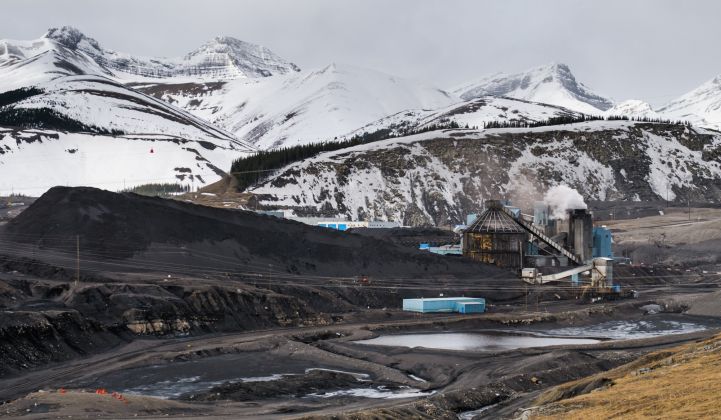Canadian Prime Minister Justin Trudeau’s promise this week to implement a federal carbon tax on four provinces will likely push Canada further away from coal. Ontario, Saskatchewan, Manitoba and New Brunswick must adhere to a CAD $20 Canadian per ton tax in 2019, rising to CAD $50 by 2022.
Though there are few coal plants located in those provinces, analysts say trends in provinces like Alberta — which has a carbon tax — show an effective pricing scheme will likely increase financial distress for those plants. In 2016, Canada got 6 percent of its electricity from coal, 10 percent from gas and oil, and 7 percent from non-hydro renewables.
“As long as that pricing mechanism is set to be effective, it will have a material difference in the business case for coal plants,” said Binnu Jeyakumar, program director of electricity at Canada’s Pembina Institute.
Most of the provinces that must adhere to the plan have declined to create their own carbon price, as required by federal mandate. Last year Manitoba, an exception, set a flat tax of $25 per ton on carbon. It withdrew that plan this October in protest of warnings from the federal government that it would have to adhere to the higher federal tax.
Manitoba has already moved away from coal, with its last plant set to retire next year.
According to Wood Mackenzie, Saskatchewan has four coal plants, with most retiring in the next couple decades and one remaining open until 2071. Ontario has no coal power plants. New Brunswick has one coal plant remaining, set to close in 2029.
Nishit Pande, a senior research analyst at WoodMac, said shutdowns could come slightly earlier depending on how the carbon tax policy impacts plant economics.
“One thing I can say with surety is [coal plants] will be financially distressed,” said Pande. “It will be tough for them to run, unless they are reliability must-run, or they convert themselves to seasonal support or they just run at peak hours and eat up the losses.”
However, that financial pressure may shut down plants a year or two ahead of schedule, rather than causing mass closures.
“I don’t think it’s going to move the needle that much,” he said.
Bloomberg New Energy Finance data presented at Pembina's 2017 Alberta Climate Summit suggested that a carbon price of $30 per ton implemented in Canada makes onshore wind and utility-scale solar cost-competitive with coal between 2025 and 2030. Renewables compete with combined-cycle gas turbines a bit later.
Alberta’s economywide carbon tax, implemented in 2017 as $20 per ton and rising to $30 in 2018, has already been a boon for renewables.
“Under the current carbon pricing scheme for Alberta’s electricity sector, renewables can monetize their low carbon attributes to the tune of $11 to $17 per megawatt-hour,” said Jeyakumar. “The certainty of such policies can also help developers with financing their projects.”
When the province introduced its updated tax plan in late 2015, Alberta’s government said it would phase out coal by 2030 and replace two-thirds of it with renewable energy.
“We started to see the impacts right away,” said Jeyakumar. “Coal plant owners started announcing either mothballing of plants — temporarily shutting them down — or committing to convert their plants to fire gas instead of coal, so fuel-switching.”
Alberta’s current tax also funds a variety of new energy-efficiency rebates and innovation grants. According to Energy Efficiency Alberta, in the first year of the tax over 500 homes and businesses applied for the province’s residential and commercial solar program, totaling 16 megawatts of new capacity.
Whether other provinces will see those types of results remains unclear. According to Jeyakumar, the impacts of an expanded carbon tax are relatively straightforward, in principal.
“If you have an effective carbon price, what you should see is more innovation for reducing greenhouse gas emissions of current assets,” she said. “It may sound idealistic, but that’s the impact of carbon pricing. That’s why it’s an effective tool if designed properly.”
In practice, though, the impact could vary. In Alberta’s deregulated market, it’s fairly simple to model the tax. But among the provinces now mandated to follow the federal plan, the existence of state-owned, vertically integrated utilities with different contract schemes could complicate the outcome. How the tax will impact electricity markets remains a “big question,” according to Jeyakumar.
Implementation also remains controversial. After Ontario Premier Doug Ford took office, his province sued over the plan, in addition to canceling its cap-and-trade system and clean energy contracts. Alberta’s premier said in August that the province would not sign on to the federal plan in response to a negative ruling on the Trans-Mountain pipeline, which the province hoped to use to export oil. Though Alberta’s carbon tax remains in place, it may not increase in step with the federal plan.
And Canada’s federal plan also remains incomplete. Though the government has detailed the tax on fuel, it still has to finalize its program for large emitters. Those regulations will determine how much large industrial emitters pay in tax, or whether lower emitters can sell credits to companies that exceed prescribed levels.




